Related Research Articles

Haluza, also known as Al-Khalasa, Halasa, Chellous, Elusa, al-Khalasa and al-Khalūṣ (Arabic), was a city in the Negev near present-day Kibbutz Mash'abei Sadeh that was once part of the Nabataean Incense Route. It lay on the route from Gaza to Petra.

Al-Khalasa, was a Palestinian village, located 23 kilometers southwest of the city of Beersheba. The oldest known names of the village are "Halasa" or "Chellous" and it was founded by the Nabateans or invading Mediterranean Plishtim, and then was called "Elusa" under the Byzantines where it served an administrative center in the Negev Desert. It continued as a major town by its modern name "al-Khalasa" during Mamluk rule, but was abandoned sometime in the fifteenth century CE. It was repopulated by Bedouin in the early twentieth century, after western archaeologists took an interest in it. In October 1948, it was captured by Israel during the 1948 Arab-Israeli War. The population of al-Khalasa is unknown, but all of the inhabitants were Muslims, from the al-Azizma tribe.

Elusa is a genus of moths of the family Noctuidae erected by Francis Walker in 1859.

The Elusates were an Aquitani pre-Roman tribe settled in what today is southwestern France, in the northeast of the Aquitaine territory, around the city of Elusa, which is present-day Eauze, in the French department of Gers. They were subdued by Publius Crassus, legatus of Caesar in 56 BCE.

Eauze is a commune in the Gers department in southwestern France.
Elusa may refer to

Elusa oenolopha is a species of moth of the family Noctuidae. It is known from Australia, including Queensland and New South Wales.
Elusa affinis is a species of moth of the family Noctuidae. It was described by Walter Rothschild in 1915 and is known from New Guinea.
Elusa alector is a species of moth of the family Noctuidae. It was described by Alfred Ernest Wileman and Reginald James West in 1928, and is known from the Philippines, including Luzon.
Elusa antennata is a species of moth of the family Noctuidae. It was described by Frederic Moore in 1882. It is found in the north-eastern Himalaya.
Elusa binocula is a species of moth of the family Noctuidae. It was described by George Hampson in 1911, and is known from New Guinea.
Elusa ceneusalis is a species of moth of the family Noctuidae. It was described by Francis Walker in 1859 and is known from Sundaland, the Philippines, Sulawesi, Queensland, and the Bismarck Islands.
Elusa confusa is a species of moth of the family Noctuidae. It was described by Warren in 1913, and is known from New Guinea.
Elusa cyathicornis is a species of moth of the family Noctuidae. It was described by Francis Walker in 1862 and is known from Borneo.
Elusa dinawa is a species of moth of the family Noctuidae. It was described by George Thomas Bethune-Baker in 1906, and is known from New Guinea.
Elusa flammans is a species of moth of the family Noctuidae. It was described by Warren, 1913. It is found in New Guinea.
Elusa ignea is a species of moth of the family Noctuidae. It was described by Warren in 1913, and is known from New Guinea.
Elusa incertans is a species of moth of the family Noctuidae. It was described by George Thomas Bethune-Baker in 1906, and is known from New Guinea.
Elusa inventa is a species of moth of the family Noctuidae. It was described by Emilio Berio in 1977, and is known from China.
Elusa subjecta is a moth of the family Noctuidae first described by Francis Walker in 1865. It is found in Sri Lanka, India and the Andaman Islands.
References
- ↑ Elusa Walker, [1859] at Markku Savela's Lepidoptera and Some Other Life Forms
| This Hadeninae-related article is a stub. You can help Wikipedia by expanding it. |